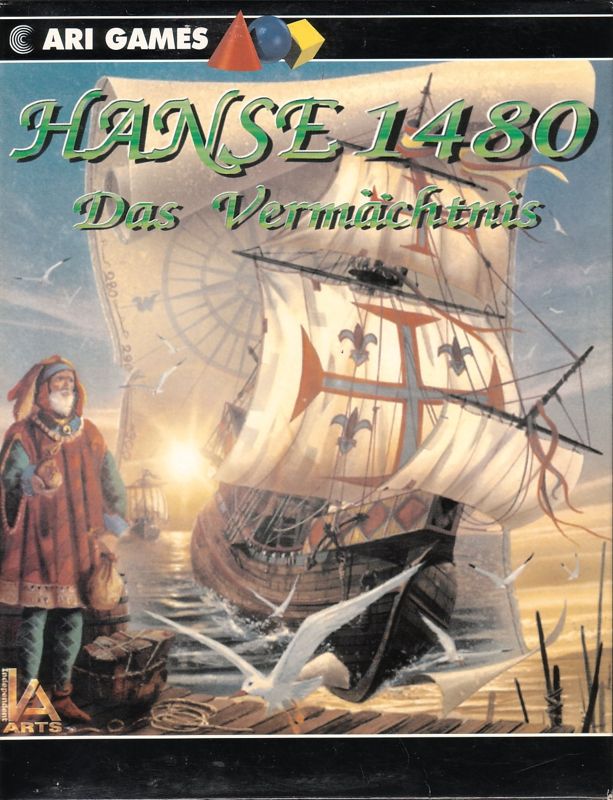Retro Replay Review
Gameplay
Hanse 1480: Das Vermächtnis places you at the helm of a burgeoning maritime trading enterprise in the late Middle Ages. Your primary task is to buy and sell 16 distinct commodities—such as salt, grain, timber, and furs—across a dozen bustling ports around the North and Baltic Seas. Each city’s supply and demand fluctuate dynamically, forcing you to constantly scan price charts and historical trends to chart the most profitable routes. The core loop of scouting markets, negotiating cargo, and optimizing logistics will satisfy strategy fans who relish number-crunching and long-term planning.
(HEY YOU!! We hope you enjoy! We try not to run ads. So basically, this is a very expensive hobby running this site. Please consider joining us for updates, forums, and more. Network w/ us to make some cash or friends while retro gaming, and you can win some free retro games for posting. Okay, carry on 👍)
Beyond trading, the game introduces a compelling layer of risk management via piracy. When your vessels traverse dangerous waters, you must fend off marauding corsairs in real time. These skirmishes are conducted with simple point-and-click mechanics: position your ship to catch the wind, line up broadside volleys, and time your evasive maneuvers to outgun agile pirate sloops. Though the interface is accessible, the pressure of balancing cargo safety and combat readiness adds a welcome dash of adrenaline to the otherwise tranquil world of commerce.
Competition is fierce. Up to four trading houses—each controlled by human players or sophisticated AI opponents—vie for dominance between 1400 and 1480. As the years progress, new technologies emerge and market conditions shift, keeping you on your toes. You must reinvest profits wisely into expanded fleets, better-armed ships, larger crews, and upgraded offices. A misstep in fleet composition or overinvestment in a single commodity can send your venture into insolvency, making every strategic choice feel weighty.
Seasoned strategy gamers will appreciate the depth of economic simulation, while newcomers can lean on the game’s in-built tutorials and gradual difficulty ramp. The interface presents complex data in neatly organized tables and charts, though mastering the finer points of supply chains and competitive bidding may require time and patience. Overall, the gameplay strikes a solid balance between intricate trade mechanics and bite-sized naval combat, offering an engrossing experience that evolves over four decades of in-game history.
Graphics
Hanse 1480: Das Vermächtnis sports a visually faithful representation of the 15th-century Hanseatic trade network. Its stylized world map is adorned with detailed port icons and sea routes that glow to indicate current trade winds and piracy hotspots. Although textures and models aren’t cutting-edge by today’s blockbuster standards, the game’s art style evokes a period-appropriate ambiance that draws you into medieval coastal towns, foggy harbors, and rolling sea waves.
When managing your fleet or browsing through commodity listings, the user interface stays clear and purposeful. Iconography for goods is distinct—timber appears as bundled logs, while spices shimmer in ornate sacks—allowing you to process market data at a glance. Pop-up tooltips provide historical backstory for each city’s specialty exports and import demands, reinforcing the educational underpinnings of the title without overwhelming newcomers with encyclopedic detail.
Naval skirmishes transition you into a closer, almost isometric view of your ship and its adversaries. The water physics are simplified but effective: cannon fire splashes convincingly, sails billow realistically in the wind, and ship hulls show damage progressively. While the combat visuals won’t rival dedicated action titles, they deliver just enough flair to make each pirate encounter feel distinct—whether you’re facing a lone brigand or a squadron of corsairs.
Performance-wise, Hanse 1480 runs smoothly on a broad range of hardware configurations. Load times between the strategic map and skirmish zones are brief, and the framerate remains stable even when multiple AI competitors are executing complex trade routes. Though modding support is limited, players have noted that the game’s clean codebase minimizes crashes and conflicts, making for a polished and stable presentation.
Story
While Hanse 1480 is primarily a sandbox economic simulation, it weaves in subtle narrative threads that reflect the spirit of the Hanseatic League. From the outset, you’re cast as the inheritor of your family’s modest shipping firm, tasked with expanding your holdings from a single cog to a formidable fleet of galleons. Occasional events—such as droughts, market gluts, or diplomatic disputes—serve as narrative anchors, reminding you that the medieval world was as volatile as it was lucrative.
Trade expeditions to distant ports are punctuated by journal entries that describe local customs, political intrigues, and folklore. These vignettes give each voyage a sense of purpose beyond profit, inviting you to imagine the personal stories of your captains and crew. Although there’s no fixed storyline or heroic protagonist arc, the emergent drama of entrepreneurship and survival provides a compelling backdrop for your strategic decisions.
Player-driven goals replace rigid narrative constraints. A decision to commission a new shipyard in Lübeck or establish a maintenance depot in Tallinn can trigger friendly alliances or trade embargoes, effectively shaping the power dynamics of the region. This open-ended storytelling fosters a sense of ownership; you aren’t just following a script, but authoring your own legacy in the annals of Hanseatic commerce.
For history enthusiasts, the game’s attention to period detail is a highlight. City descriptions reference real-world medieval institutions, and the depicted trade goods mirror authentic regional specializations. While Hanse 1480 doesn’t strive for documentary-level accuracy, its blend of factual flavor and strategic freedom crafts a subtly immersive narrative that complements the economic gameplay.
Overall Experience
Hanse 1480: Das Vermächtnis is a satisfying blend of deep economic strategy and light naval action, set against the evocative backdrop of 15th-century Northern Europe. Its meticulous market simulation challenges players to think several moves ahead, while sporadic pirate encounters inject just enough excitement to break the rhythm of supply-and-demand calculations. The game rewards patience, analytical thinking, and adaptability, making each playthrough a unique journey through medieval trade politics.
The learning curve can be steep for those unaccustomed to resource management titles, but the game’s in-built guidance systems and gradual escalation of difficulty ease newcomers into its mechanics. Multiplayer support—allowing friends to assume rival trading houses—adds a layer of human unpredictability that heightens competition and camaraderie. Solo players will find the AI both competent and occasionally cunning, ensuring the strategic challenge remains fresh over the roughly 80-year campaign span.
Graphically, Hanse 1480 leans on stylized visuals rather than flashy effects, which aligns perfectly with its focus on cerebral gameplay. Load times are swift, the UI is intuitive, and the sound design—complete with creaking timbers, gull cries, and medieval tavern tunes—rounds out the sensory immersion. While the game doesn’t radically reinvent the wheel in the genre, it refines and expands upon its predecessor’s foundations with enough new features and polish to stand on its own.
For fans of economic simulations, historical strategy, or simply anyone captivated by the romance of the high seas, Hanse 1480: Das Vermächtnis offers a rich, rewarding experience. Its blend of market-driven objectives, naval skirmishing, and emergent storytelling ensures that no two trading careers unfold in quite the same way. If you’re ready to navigate shifting alliances, outwit rival merchants, and carve your own path to Hanseatic glory, this game is well worth your investment.
 Retro Replay Retro Replay gaming reviews, news, emulation, geek stuff and more!
Retro Replay Retro Replay gaming reviews, news, emulation, geek stuff and more!




Reviews
There are no reviews yet.